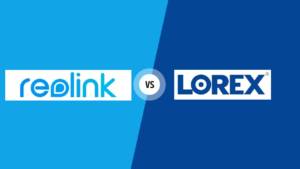Are you a course creator trying to decide between Skillshare vs Udemy? Choosing the right platform to host your online courses is crucial for your success as an instructor. Both Skillshare and Udemy are among the best online learning platforms; each offering unique features, audiences, and monetization models. This blog post dives deep into comparing these two platforms across various critical aspects such as course creation, monetization opportunities, audience reach, and more. Whether you’re new to online teaching or looking to expand your existing catalog, understanding the nuances of Skillshare vs Udemy will help you make an informed decision that aligns with your goals as an educator and content creator.
Table of Contents
Platform History and Reputation
When comparing Skillshare vs Udemy as a course creator, take each platform’s reputation and history into account. Your choice of venues for your courses can be influenced by your knowledge of their origins and market perception.
Skillshare began its journey in 2010, emerging as a community-centric platform. It focused on creative, entrepreneurial, and lifestyle classes. Skillshare’s model encourages interactive, project-based learning, creating a vibrant community of learners and teachers. The platform has built a reputation for fostering creativity and practical skills, making it a favorite among creative professionals and hobbyists. For a course creator in the creative industry, Skillshare’s reputation offers a ready audience that appreciates hands-on, creative learning.
Udemy, founded in 2010, took a broader approach. It offers a vast range of courses, from technology and business to personal development. This diversity attracts a wide array of students, making it a versatile platform for instructors. Udemy’s pay-per-course model allows instructors to reach millions of students worldwide, making it a popular choice for those looking to reach a diverse audience. With its focus on professional development, Udemy is particularly well-regarded among professionals seeking to enhance their job-related skills.
Both platforms have established a strong presence in the online learning community. While Skillshare is often associated with creative learning and community engagement, Udemy is known for its wide-ranging course offerings and professional development focus.
For course creators, the decision between Skillshare vs Udemy often hinges on the type of audience they aim to reach and the nature of the content they wish to create. Understanding the strengths and reputations of each platform can help in making an informed choice.

Ease of Course Creation and Upload
Ease of course creation and upload process is a crucial factor for content creators weighing Skillshare vs Udemy. Both platforms offer unique tools and features to streamline this process, but they differ in approach and user experience.
Skillshare emphasizes simplicity and accessibility in its course creation process. The platform guides creators through each step, from planning to publishing. It provides resources on how to structure a class, engage with students, and build a following. Skillshare’s interface is straightforward, catering to both novice and experienced creators. However, the platform is more suited to shorter, project-based courses, which is something creators should consider.
Udemy, on the other hand, offers a more flexible course creation experience. Instructors have the freedom to design extensive and comprehensive courses. The platform provides detailed guidelines and resources on course development, including video quality, content structure, and student engagement. Udemy’s course upload process is robust, allowing for a variety of multimedia content, which is ideal for creators looking to produce in-depth instructional content.
In the Skillshare vs Udemy comparison, both platforms provide supportive resources like video tutorials, help centers, and community forums to assist creators. However, the choice depends on the nature of the content and the desired course length and depth.
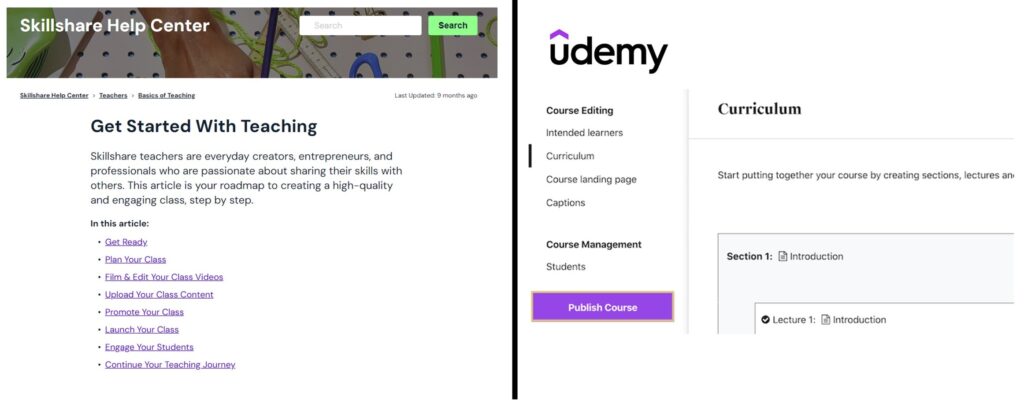
Content Control and Ownership
It’s critical to understand how each platform manages content rights and ownership when comparing Skillshare vs Udemy for course creation. This factor can significantly impact an author’s decision on where to host their courses.
Skillshare operates on a membership model, where students pay for access to all courses through a subscription. For course creators, this means that while they retain ownership of their content, the revenue generated is based on a royalty system. Skillshare calculates payments based on the number of minutes watched by premium members in their classes. Creators have the flexibility to update and modify their courses, but the platform’s community-oriented nature often requires regular engagement and content updates to stay relevant and visible.
Udemy, in contrast, offers more direct control over pricing and revenue. Instructors on Udemy have the freedom to set their course prices and can update or remove their content at will. The revenue model is more straightforward, with instructors earning a percentage of the sale each time a student purchases their course. This model can be more appealing to creators looking for greater control over their earnings and content distribution.
For creators evaluating Skillshare vs Udemy, it’s important to consider these differences in content control and ownership. Skillshare’s model may suit those who prefer a community-driven approach and are willing to engage regularly with their audience. Udemy, meanwhile, may appeal more to those seeking direct sales and more control over pricing.
While both platforms offer a degree of flexibility and control, the choice ultimately depends on the creator’s priorities. Do they value a potentially wider audience through a subscription model, or do they prefer the autonomy of setting prices and directly selling their courses? Understanding these nuances is key to making an informed decision in the Skillshare vs Udemy debate.
Monetization Opportunities and Course Pricing
Understanding the monetization opportunities and course pricing structures is crucial for course creators considering Skillshare vs Udemy. Each platform offers distinct models and opportunities for earning, influencing how you can generate income from your courses.
Skillshare operates on a subscription-based model, meaning that creators earn money through a royalty system. Royalties are calculated based on the total number of minutes watched across all of their courses each month, relative to the total number of minutes watched on the platform. The more engaging and popular your content, the higher your potential earnings. However, creators on Skillshare do not set individual course prices, as access is granted through a subscription fee paid by members. This model is beneficial for creators who focus on creating engaging content that keeps students returning.
Udemy, in contrast, allows instructors more freedom in setting their course prices. Each sale’s revenue is split between the instructor and Udemy, with the percentage varying depending on how the student was acquired. For example, instructors earn a higher percentage from sales made through their own marketing efforts compared to those made through Udemy’s promotional activities. This direct sales approach provides creators with more control over their potential earnings but also requires them to be more proactive in marketing their courses.
When weighing Skillshare vs Udemy, consider your content type, target audience, and how you wish to monetize your courses. Skillshare might be more suitable for creators who can produce content that continuously engages a subscription-based audience. In contrast, Udemy may be a better fit for creators looking to generate direct sales with comprehensive, in-depth courses and are willing to engage in active marketing and price management.
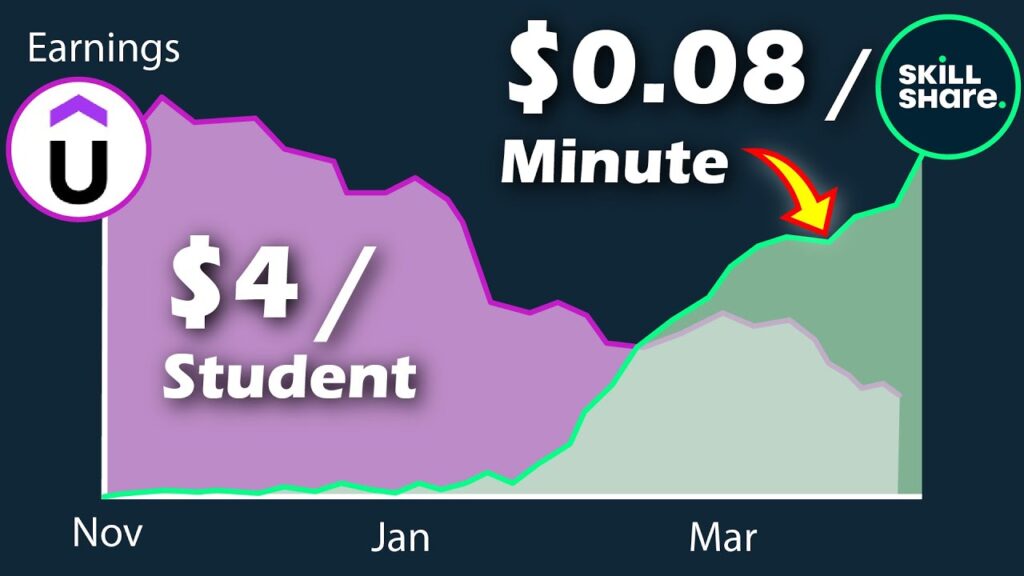
Audience Reach and Marketing Support
To maximize the visibility and success of their courses, you need to know the differences between Skillshare vs Udemy in terms of audience reach and marketing help.
Skillshare primarily targets creative professionals, hobbyists, and entrepreneurs. Its audience tends to be looking for shorter, project-based classes focused on skill-building. Skillshare helps creators with marketing by featuring popular and high-quality courses in their promotions and on their website. However, creators are also encouraged to self-promote their courses through social media and other channels. Skillshare’s platform is beneficial for creators who have or wish to build a strong personal brand and connect directly with their audience.
Udemy boasts a broader, more diverse audience, attracting individuals seeking professional development, technical skills, and personal growth. Udemy supports its creators with marketing tools such as promotional announcements and coupons, enabling instructors to run their own marketing campaigns. Additionally, Udemy courses often rank well on search engines, providing an organic visibility boost. This platform is ideal for creators looking to reach a wide range of students from different backgrounds and interests.
In the Skillshare vs Udemy comparison, both platforms offer unique advantages in terms of audience reach and marketing support. Skillshare is ideal for creators who thrive in community engagement and personal brand building, while Udemy suits those who prefer a wider, more diverse audience and appreciate having robust marketing tools at their disposal.
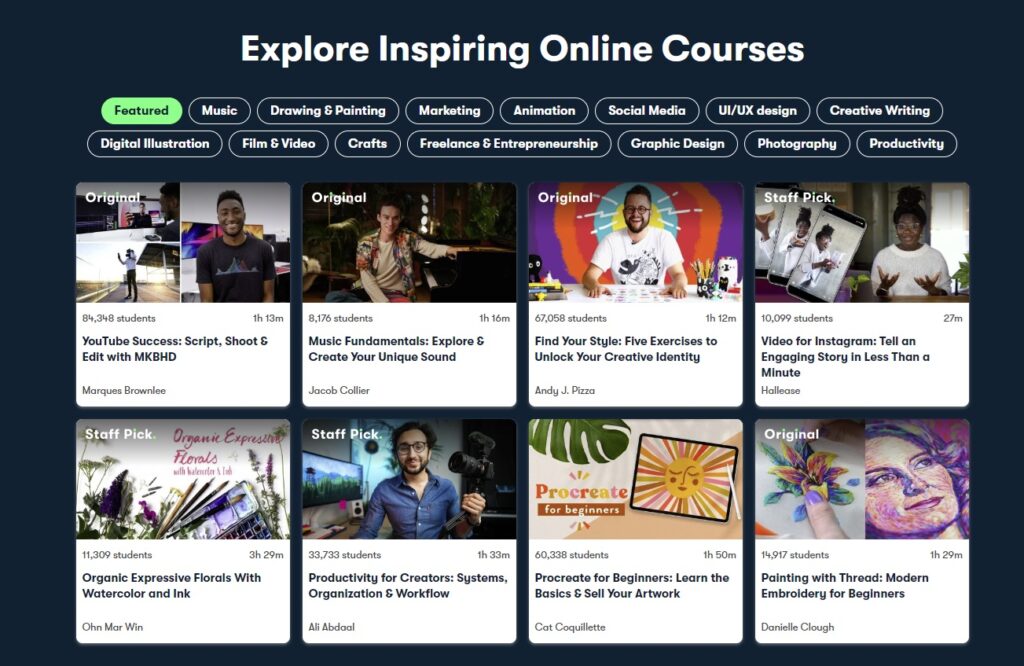
Community and Networking
In the debate of Skillshare vs Udemy, the aspects of community and networking are crucial for course creators, as these factors can significantly influence the success and reach of their courses.
Skillshare strongly emphasizes community engagement. The platform fosters an interactive environment where creators and learners can connect through project-based classes. Instructors on Skillshare have the opportunity to engage with their audience through class projects, discussions, and feedback. This level of interaction can be invaluable for creators looking to build a loyal following and network with like-minded individuals. Skillshare’s community-oriented approach is ideal for those who value close interaction and collaborative learning.
Udemy, while less focused on community interaction within the platform, still offers networking opportunities. Instructors can interact with students through Q&A sections and course reviews. However, the networking aspect on Udemy is more about expanding reach and establishing authority in a specific subject area rather than fostering a close-knit community. Udemy’s structure is suitable for creators who prefer to focus on content creation and leverage their expertise to reach a broader audience.
When weighing Skillshare vs Udemy, consider the type of community interaction and networking opportunities you are looking for. Do you prefer a platform where you can actively engage and build a community around your content, or do you seek a platform that allows you to reach a wide audience and establish yourself as an expert in your field?
Feedback and Analytics
For course creators, the availability and quality of feedback and analytics are pivotal factors in the Skillshare vs Udemy comparison. These tools not only help in understanding student engagement but also in refining and improving course content.
Skillshare offers basic analytics to its course creators. These include insights into student engagement, such as the number of students, class reviews, and project submissions. This feedback is valuable for creators who wish to foster a community and improve their courses based on direct student interactions. Skillshare’s focus is more on qualitative feedback, emphasizing student projects and discussions, which can be especially useful for courses that are project-based or creativity-oriented.
Udemy, conversely, provides more comprehensive analytics and feedback tools. Creators on Udemy have access to detailed data about their course performance, including student demographics, video engagement metrics, and course completion rates. Additionally, Udemy offers a robust review system where students can rate courses and leave feedback, providing instructors with quantitative data to assess and improve their courses. This level of detail can be crucial for creators who rely on data-driven insights to tailor their content and marketing strategies.
When comparing Skillshare vs Udemy for feedback and analytics, it’s important to consider your preferences and the nature of your courses. If you value detailed, data-driven insights to guide your course development, Udemy may be more suitable. If you prefer community-driven, qualitative feedback, Skillshare could be the better choice.
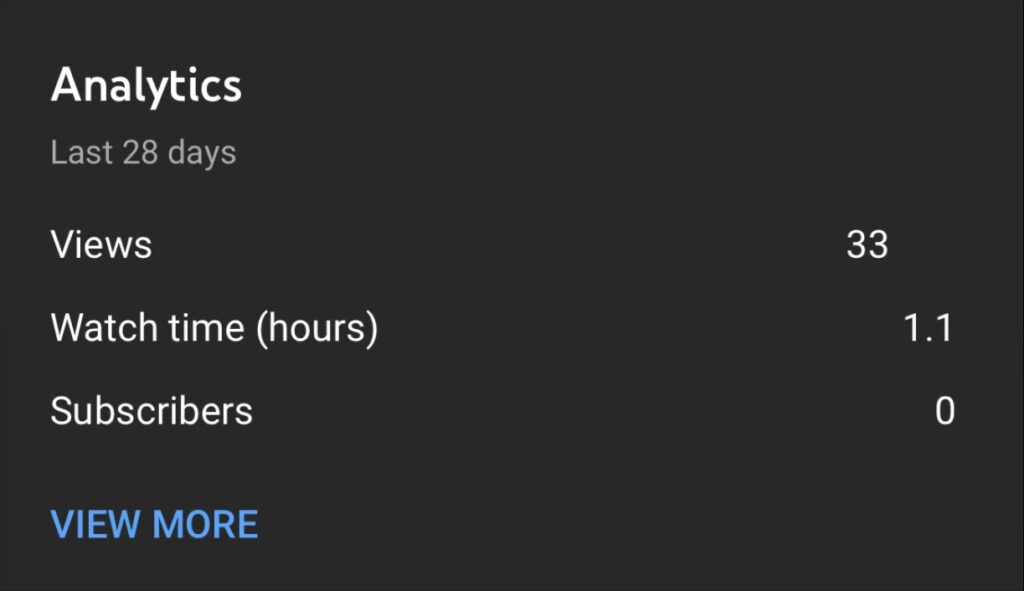
Technical Support and Resources
When course creators consider Skillshare vs Udemy, the level of technical support and resources provided by each platform is a critical factor. This support can greatly influence the ease of course creation, maintenance, and overall user experience.
Skillshare offers a range of resources aimed at helping creators produce and manage their courses. This includes access to comprehensive guides on course creation, video production tips, and community forums where creators can exchange ideas and solutions. While Skillshare’s technical support is primarily community-driven, it is effective for creators who are comfortable with a more collaborative approach to problem-solving.
Udemy provides extensive technical support and resources to its instructors. This includes a detailed instructor dashboard, where creators can access a wealth of information on course creation, marketing, and student engagement. Udemy also has a dedicated support team that can be reached for more technical queries or issues. This level of support is particularly beneficial for creators who require more direct assistance or are dealing with complex course structures.
In the debate of Skillshare vs Udemy for course creation, it’s important to assess your own technical skills and the level of support you might need. Skillshare is well-suited for creators who prefer a self-service model with community support, while Udemy is ideal for those who might require more hands-on technical assistance.
Quality Standards and Course Approval
When comparing Skillshare vs Udemy, understanding each platform’s quality standards and course approval processes is vital for course creators. These standards not only ensure a consistent learning experience for students but also reflect on the credibility of the instructors and their content.
Skillshare focuses on creative, interactive, and project-based courses. Its quality standards are geared towards encouraging engagement and creativity. While Skillshare reviews courses for basic quality and guideline adherence, the platform is generally more lenient, allowing for a broader range of course styles and formats. This can be an advantage for creators who wish to experiment with different teaching styles or course structures.
Udemy has more stringent quality standards and a detailed course approval process. Every course submitted goes through a quality review, where it is evaluated against a set of criteria including video quality, audio clarity, and course content organization. This rigorous process ensures that all courses meet a high standard, which can be appealing to creators who pride themselves on producing professional-grade content.
For creators weighing Skillshare vs Udemy, it’s important to consider these differences. Skillshare may be more suitable for those who prefer a less formal approach to course creation, while Udemy is ideal for creators seeking to establish themselves with highly polished and professionally packaged courses.
Platform-Specific Features for Creators
In the context of Skillshare vs Udemy, each platform offers unique features tailored to the needs and preferences of course creators. Understanding these platform-specific features is crucial for instructors to determine the best fit for their teaching style and content.
Skillshare stands out with its strong emphasis on community and interactivity. Key features include:
- Project-Based Learning: Courses often revolve around a specific project, encouraging hands-on learning.
- Class Discussions: Instructors can engage directly with students through class discussion forums, fostering a strong community feel.
- Shorter Course Formats: The platform is geared towards shorter classes, making it ideal for bite-sized learning and teaching.
These features make Skillshare an attractive option for creators who thrive in a community-driven environment and are focused on creative and lifestyle topics.
Udemy, on the other hand, offers features that cater to a wide range of topics and more in-depth learning:
- Extensive Course Builder: A comprehensive toolset for creating and structuring detailed courses, including quizzes, assignments, and downloadable resources.
- Q&A and Messaging: Tools for direct communication with students, allowing instructors to address questions and provide additional support.
- Promotional Tools: Robust marketing tools to help instructors promote their courses, including discount coupons and promotional announcements.
Udemy’s features are well-suited for instructors looking to create extensive, detailed courses that cover a wide range of subjects, from professional development to personal hobbies.
When considering Skillshare vs Udemy, it’s important for creators to align their course content and teaching style with the features each platform offers.

Success Stories and Case Studies
Examining success stories and case studies is a valuable aspect for course creators considering Skillshare vs Udemy. These real-world examples can provide insights into what works well on each platform and inspire strategies for course success.
Skillshare has numerous success stories, particularly among creators who specialize in creative arts, design, and entrepreneurship. These instructors have often built a strong community around their courses, engaging students with interactive projects and active discussion forums. Highlighted stories often feature creators who have leveraged Skillshare’s community-centric model to build a loyal following and achieve consistent engagement across multiple courses.
Udemy showcases success stories from a diverse range of fields, including technology, business, and personal development. Case studies on Udemy often emphasize the platform’s global reach and the ability of instructors to tap into a large and diverse student base. Success on Udemy is frequently linked to the creation of comprehensive, in-depth courses that cater to professional development and skill enhancement.
For creators making a decision between Skillshare vs Udemy, these success stories and case studies can be a source of inspiration and a guide to what might resonate with students on each platform.
Challenges and Considerations
Navigating the challenges and considerations is a critical part of the decision-making process for course creators comparing Skillshare vs Udemy. Being aware of potential hurdles and key factors can help in making a well-informed choice that aligns with personal goals and content strategies.
Skillshare presents specific challenges, mainly due to its subscription-based model. Creators need to continuously engage their audience to ensure consistent viewership and earnings. This can require regular course updates and active participation in community discussions. Additionally, the platform’s focus on creative and lifestyle courses means that content outside these niches might not perform as well.
Udemy poses different challenges. The open marketplace model can lead to high competition in popular subject areas, making it harder for new instructors to stand out. Pricing can also be a challenge, as frequent discounting and promotions may impact perceived course value. Furthermore, the reliance on self-promotion for course visibility demands a significant effort in marketing from the creators.
For course creators weighing Skillshare vs Udemy, it’s crucial to consider:
- The type and niche of the content being created.
- The preferred teaching style and level of interaction with students.
- The willingness to engage in marketing and self-promotion.
- The desired revenue model and potential income stream.
Conclusion and Recommendations: Skillshare vs Udemy
In concluding the comparison between Skillshare vs Udemy for course creators, it’s clear that both platforms offer unique opportunities and challenges. Your choice ultimately depends on your content type, engagement style, and goals as a creator.
Skillshare is ideal for those who are focused on creative, lifestyle, or entrepreneurial content and thrive in a community-driven environment. Its project-based learning format and active user engagement make it a great platform for creators who want to build a following and interact closely with their audience. Skillshare’s subscription model suits creators who prefer to earn through student engagement rather than direct sales.
Udemy, on the other hand, is more suited for creators who want to develop comprehensive, in-depth courses across a wide range of topics, including professional development and technical skills. The platform’s pay-per-course model is beneficial for those looking to have more control over pricing and who are willing to invest in marketing their courses. Udemy’s global reach and robust analytics tools make it an excellent choice for creators aiming to tap into a broader market.
When deciding between Skillshare vs Udemy, consider:
- Your course content and the audience you wish to reach.
- Your preferred teaching and engagement style.
- How you want to monetize your courses.
- The level of marketing effort you are ready to put in.
Both platforms offer distinct advantages and cater to different types of content and teaching styles. By understanding your own goals and the unique offerings of each platform, you can make a choice that best aligns with your aspirations as a course creator.
Remember, the journey of a successful course creator involves continuous learning and adaptation. Whichever platform you choose, embrace the opportunities to grow, engage with your audience, and refine your content to achieve the success you envision.


